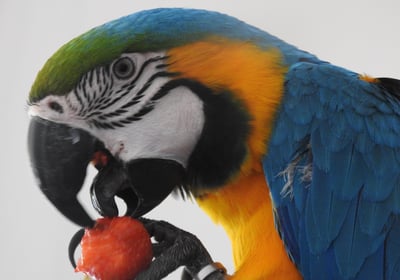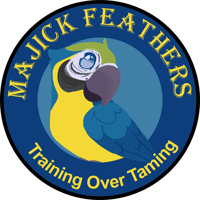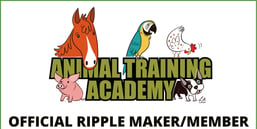Parrots DIET - The Other 4 Letter Word
8/4/20245 min read


DIET - Like so many other 4 letter words is often a taboo subject to talk about. A parrots diet is just as important as a humans diet and there is just as many ideas and theories out there on what is good or not good for our feathered friends so let's look at some basics.
Parrot Diet Basics
A suitable diet will contain good nutrients and minimise excess fat and sugars. Unlike their wild brothers and sisters our pet parrots do not get the same amount of exercise so limiting excessive fats and sugars is important for weight control, disease control and behavior.
Imagine feeding a child high fat and sugar then asking them to sit in a room and be quiet and respond nicely..... it is the same effect for our parrots. Excessive screaming, biting, feather plucking and other destructive behaviors can often be helped by a change in diet and simple behavior modification techniques.
The most common deficiency in parrots is vitamin D and A so sunshine and a good variety of vitamin A rich food are missing from our parrots diets. Spinach, rocket or other leafy greens along with bell peppers/ capsicum or lightly cooked sweet potato among other foods can change this and add variety to the diet that once a parrots is familiar with they will love
Pellets can offer offer a non fatty base to a parrots diet but most will not be a complete diet and often parrots will refuse them possibly because they do not have the moisture content of natural foods and a parrot will drink more water if their diet is primarily a pellet diet. Regardless of food offered always make sure they have access to ample clean drinking water.
Converting a parrot to a healthy diet is not always easy. sometimes they don't recognise that the new food is actually food and other times they are just stubborn and prefer the junk they have had before but persist. You would not eat only ice cream for every meal because it would be very unhealthy, same goes for your birds.
Every species of parrots will have varied diet requirements and as a parrot care giver it is up to you to research your parrots and provide the diet that is right for them. One common thing among all parrots is that no one should be feed a seed only diet. This would be like us eating a pizza only diet.
What ever you choose to feed your parrots a well rounded balanced diet will improve their feather condition, health and behavior.
Understanding Your Parrots Nutritional Needs
Parrots have specific nutritional needs to stay healthy and thrive. It is important to understand these needs to provide them with a balanced diet. For instance, Macaws require a diet that is high in fruits, vegetables, and nuts. They need a variety of nutrients such as vitamins, minerals, and healthy fats to support their overall health.
In addition to vitamins and minerals birds also need some protein in their diet. Although it is hard to study the wild birds diet, it is believed by many that wild parrots may eat some insects and larvae which would be high in protein. A small amount of meal worms ( readily available dried) could be a way of increasing a parrots protein if required. It is important to provide a variety of foods to ensure that your parrot is getting all the nutrients they need.
In order to provide the very best care & nutrition for companion parrots, Majick Feathers recommends conducting thorough research from a trusted source or consult with a veterinarian or avian nutritionist to fully understand the nutritional requirements of your species of bird
Another great article about nutrition can be found on the Avian Diet & Nutrition website - Read the article HERE
Homemade Treats: Recipes Your Bird Will Adore
Making homemade treats for your bird is a great way to ensure that they are getting healthy and tasty snacks. Here are a few recipes that your parrot will adore:
- Nutty Banana Bites: Mash a ripe banana and mix it with finely chopped nuts, such as almonds or walnuts. Shape the mixture into small balls and freeze them. Your parrots will love these frozen treats!
- Veggie Kabobs: Skewer pieces of fresh vegetables, such as bell peppers, carrots, and zucchini. This colorful and nutritious treat will keep your bird entertained and satisfied.
- Coconut Crunchers: Mix unsweetened shredded coconut with a small amount of natural peanut butter. Shape the mixture into small balls and roll them in crushed nuts. These crunchy treats are a delicious option for your bird.
Using Seeds & Nuts In Your Parrots Diet
Seeds & nuts are an important part of a balanced diet as they provide essential nutrients and healthy fats. Most parrots will enjoy a variety of nuts, including almonds, walnuts, and Brazil nuts. They can be given as a treat or incorporated into their regular meals.
When using nuts & seeds in your birds diet, it is important to remember that moderation is key. While they are nutritious, they are also high in fat and should be given in limited quantities. Too many can lead to weight gain and other health issues. It is recommended to consult with a veterinarian or avian nutritionist to determine the appropriate amount of nuts & seeds for your parrot.
Why Nuts Should Be Kept As Training Treats
Nuts can be a great option for training treats for your bird. They are small, easy to handle, and highly palatable, making them an effective reward during training sessions.
Using nuts as training reinforcement can help reinforce positive behavior and encourage your bird to learn new tricks and cues. Choose a variety of nuts that your bird finds particularly enticing to keep them motivated during training sessions.
Remember to use nuts in moderation and adjust your birds daily diet accordingly to account for the additional calories consumed during training sessions.
Foods to Avoid: Keeping Your Bird Safe
While there are many nutritious foods that parrots can enjoy, there are also some foods that should be avoided to keep them safe and healthy. These include but are not limited to:
Avocado: Avocado contains a substance called persin, which is toxic to birds.
Chocolate: Chocolate contains theobromine, which is toxic to birds.
Caffeine: Caffeine can be harmful to parrots and should be avoided.
Alcohol: Alcohol is toxic to birds and should never be given to them.
Salt: Excessive salt intake can be harmful to parrots.
This is not an exhaustive list of food to avoid for your parrot. It is important to do thorough research from a trusted source or consult with a veterinarian or avian nutritionist to ensure that the foods you offer your birds are safe and suitable for their dietary needs.
You can read a great post about things to avoid for your companion parrot on the Unusual Pet Vets (Formally Brisbane Bird Vet) website blog - You can read it HERE
Innovative Feeding Tips for Happy, Companion Parrots
Feeding your bird can be an opportunity for enrichment and bonding. Here are some innovative feeding tips to keep them happy, healthy & engaged:
Foraging Toys: Provide your parrot with foraging toys that require them to work for their food. This stimulates their natural foraging instincts and keeps them mentally and physically active.
- Food Puzzles: Use food puzzles or treat-dispensing toys to make mealtime more challenging and engaging for your bird. This encourages problem-solving and prevents boredom.
Rotate Food Options: Offer a variety of fruits, vegetables, and nuts to keep your macaw's diet interesting. This ensures they receive a wide range of nutrients and prevents them from getting bored with their meals.
Fresh Water: Always provide your bird with fresh, clean water. Change the water daily to ensure its freshness.
By implementing these feeding tips, you can help promote a healthy eating routine and keep your bird mentally stimulated.
Majick Feathers
Nathan - 0404 080 752
Melissa - 0405 711 511
Copyright © 2025 Majick Feathers
All rights reserved.
Email us
Call Us
Majick Feathers is a proud member of


